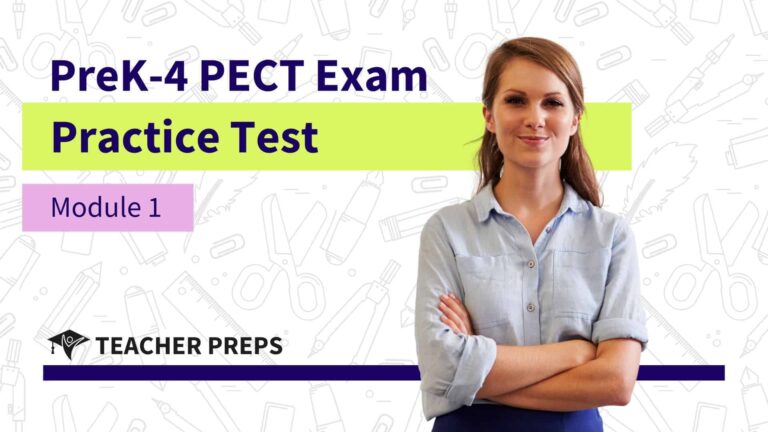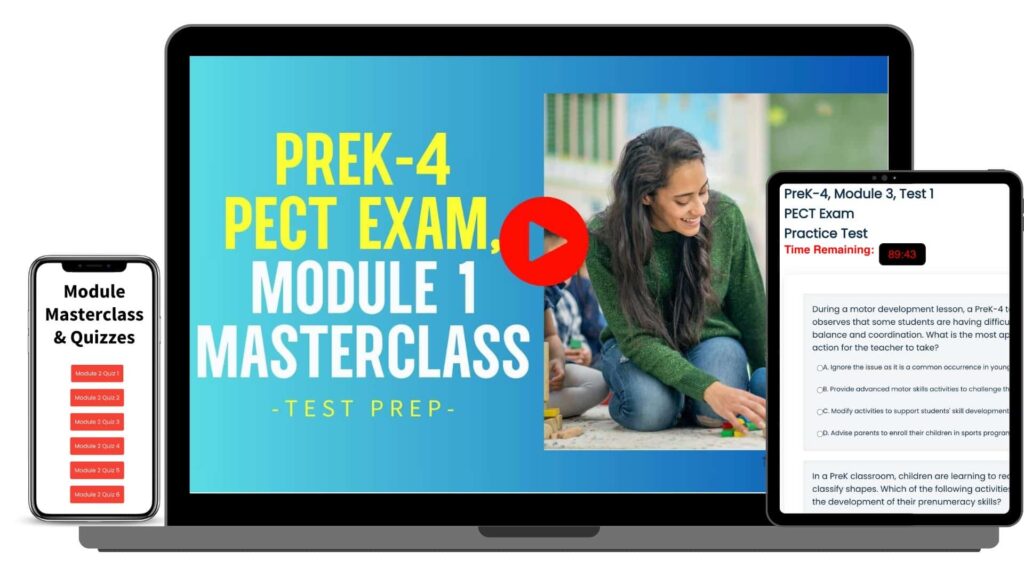
PreK-4 PECT Module 1 Practice Test
Introduction
As aspiring educators begin their journey towards certification, understanding and mastering Module 1 of the PreK-4 PECT exam is a critical first step. This module stands as a cornerstone in the certification process, designed to evaluate a candidate’s foundational knowledge in key areas that are essential for effective early childhood education.
Module 1 delves deeply into the realms of Child Development, Learning Theories, and Assessment Methods. This module is not just an assessment of knowledge; it’s an exploration of the fundamentals that shape effective teaching practices for young learners. Understanding child development is crucial as it lays the groundwork for creating appropriate learning experiences. It involves grasping the physical, cognitive, social, and emotional stages of development in children from birth through the primary grades.
In addition to child development, Module 1 places significant emphasis on Learning Theories. This section tests the candidate’s understanding of various educational theories and their practical application in the classroom. It’s about connecting theory to practice, understanding how children learn, and using this knowledge to design engaging and effective learning experiences.
Finally, Assessment Methods form a critical part of this module. Educators are required to demonstrate their proficiency in using diverse assessment strategies to evaluate and support student learning. This includes an understanding of different types of assessments and their appropriate application, as well as the ability to interpret assessment results to inform instruction.
The comprehensive focus of Module 1 sets the stage for a successful career in teaching. It equips educators with the fundamental knowledge and skills needed to nurture and assess the development of young learners effectively. In this blog post, we will explore the intricacies of Module 1, providing guidance and resources to help candidates prepare thoroughly for this crucial part of their certification journey.
PreK-4, Module 1
PECT Exam
Free Practice Test
PECT Exam
Free Practice Test
Time Remaining:
Understanding Module 1
Module 1 of the PreK-4 PECT exam is a deep dive into the core concepts that form the backbone of effective early childhood education. This module, integral to shaping competent educators, encompasses a range of topics that are essential for understanding the multifaceted nature of child development and learning.
Major Topics in Module 1:
Developmental Stages: One of the critical areas of focus in Module 1 is the understanding of various developmental stages from birth through the primary grades. This includes physical, cognitive, social, emotional, and linguistic development. Aspiring educators are expected to grasp the typical progression at each stage and recognize the unique aspects of each child’s growth. This knowledge is crucial for creating age-appropriate learning experiences and identifying any developmental concerns early on.
Learning Theories: This module also delves into various learning theories that have significantly influenced educational practices. These theories include, but are not limited to, constructivist, behaviorist, and social learning theories. Each theory offers a different perspective on how children learn and develop, providing educators with diverse approaches to teaching and classroom management. Understanding these theories allows teachers to create more effective and engaging learning environments that cater to the individual needs of their students.
Assessment Techniques: Assessment is a vital component of education. Module 1 covers a range of assessment techniques, from formative and summative assessments to more specific methods like diagnostic and portfolio assessments. Prospective educators learn how to employ these assessments effectively to monitor students’ progress, guide instruction, and make informed decisions about their teaching practices. The module emphasizes using assessment data ethically and responsibly to enhance learning outcomes for all students.
Integration into Early Childhood Education:
Understanding these core concepts is not just about passing the exam; it’s about laying the groundwork for a successful teaching career. In early childhood education, teachers must be adept at recognizing and supporting each child’s unique developmental trajectory. They need to apply learning theories in practical, age-appropriate ways and use assessment data to inform their teaching strategies continuously.
Educators equipped with this knowledge can create inclusive, nurturing, and stimulating environments where all children can thrive. They become adept at tailoring their teaching methods to individual learning styles, cultural backgrounds, and developmental levels, ensuring that each child receives a solid foundation for lifelong learning.
Types of Questions and Exam Format
Decoding the Structure of Module 1 in the PreK-4 PECT Exam
Module 1 of the PreK-4 PECT exam is meticulously designed to assess the depth of understanding in key educational areas through a structured format and specific types of questions. Gaining insights into this format is crucial for candidates to navigate the exam successfully.
Structure of Module 1:
Selected-Response Questions: The type of question in Module 1 is the selected-response question, commonly known as multiple-choice. These questions present a statement or question followed by several answer choices, among which only one is correct. The selected-response format is designed to evaluate a candidate’s ability to apply theoretical knowledge to practical scenarios in child development, learning theories, and assessment techniques.
Question Complexity: The questions in Module 1 vary in complexity. Some might require straightforward recall of facts and concepts, while others demand higher-order thinking skills. These more complex questions could involve analyzing scenarios, applying theories to specific educational situations, or evaluating the effectiveness of different assessment methods.
Question Styles: The questions may be presented in various styles, such as direct queries, situational descriptions, or case studies. Candidates might encounter questions that describe a classroom scenario, for instance, and then ask them to identify the most appropriate teaching or assessment strategy based on the information provided.
Format of the Exam:
Number of Questions and Time Allocation: Module 1 consists of 36 selected-response items, and candidates are allocated 45 minutes to complete this section. This time frame averages to about 1.25 minutes per question, requiring candidates to manage their time effectively.
Content Distribution: The questions are distributed across the key topics of the module, ensuring a comprehensive assessment of all major areas. The exam not only tests knowledge but also the ability to apply this knowledge in practical educational contexts.
Scoring: Each question typically carries equal weight, and there is no penalty for guessing, which means candidates should attempt to answer every question.
Preparing for the Exam Format:
To prepare effectively for Module 1, candidates should familiarize themselves with the selected-response format and practice time management. Engaging with practice tests that mimic the format and complexity of the actual exam can be particularly beneficial. It’s also important for candidates to review a wide range of materials covering all aspects of child development, learning theories, and assessment methods to ensure a well-rounded preparation.
Study Strategies for Module 1
For a focused approach to mastering Module 1 of the PreK-4 PECT exam, Teacher Preps offers a specialized test preparation program. This includes a concise study guide covering key concepts in Child Development, Learning, and Assessment, supplemented by an interactive video masterclass. The program also provides quizzes for self-assessment and full-length practice tests that mirror the exam format, aiding in familiarization and boosting confidence. This combination of resources is designed to enhance understanding and retention, catering to various learning styles for effective exam preparation. For more details, visit Teacher Preps.




